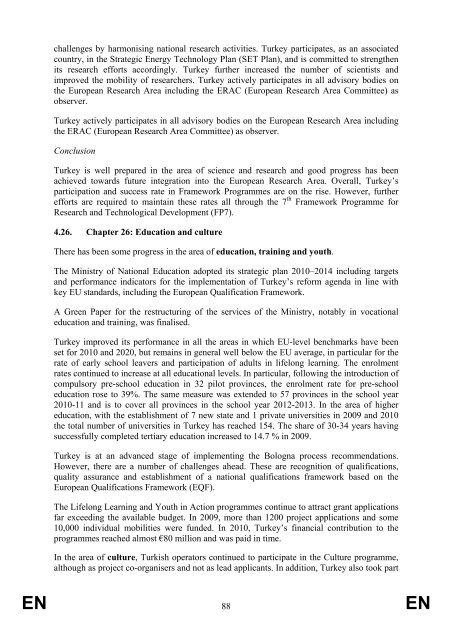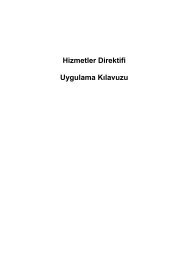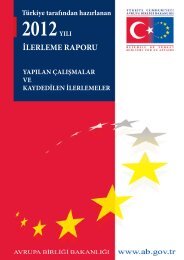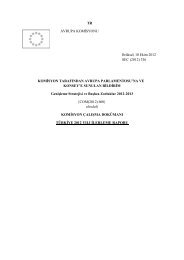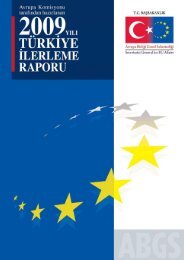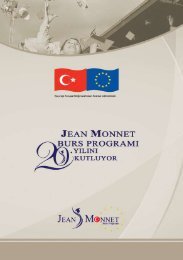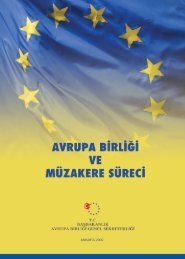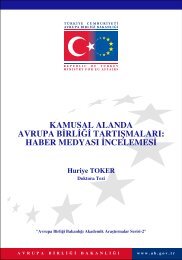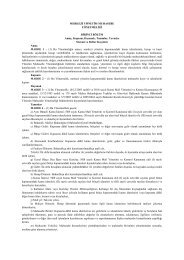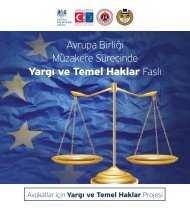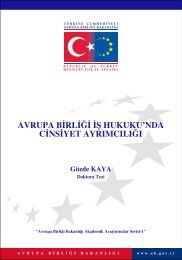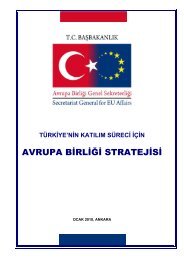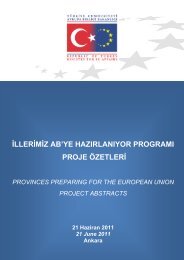2010 ilerleme raporu - Avrupa Birliği Bakanlığı
2010 ilerleme raporu - Avrupa Birliği Bakanlığı
2010 ilerleme raporu - Avrupa Birliği Bakanlığı
Create successful ePaper yourself
Turn your PDF publications into a flip-book with our unique Google optimized e-Paper software.
challenges by harmonising national research activities. Turkey participates, as an associatedcountry, in the Strategic Energy Technology Plan (SET Plan), and is committed to strengthenits research efforts accordingly. Turkey further increased the number of scientists andimproved the mobility of researchers. Turkey actively participates in all advisory bodies onthe European Research Area including the ERAC (European Research Area Committee) asobserver.Turkey actively participates in all advisory bodies on the European Research Area includingthe ERAC (European Research Area Committee) as observer.ConclusionTurkey is well prepared in the area of science and research and good progress has beenachieved towards future integration into the European Research Area. Overall, Turkey’sparticipation and success rate in Framework Programmes are on the rise. However, furtherefforts are required to maintain these rates all through the 7 th Framework Programme forResearch and Technological Development (FP7).4.26. Chapter 26: Education and cultureThere has been some progress in the area of education, training and youth.The Ministry of National Education adopted its strategic plan <strong>2010</strong>–2014 including targetsand performance indicators for the implementation of Turkey’s reform agenda in line withkey EU standards, including the European Qualification Framework.A Green Paper for the restructuring of the services of the Ministry, notably in vocationaleducation and training, was finalised.Turkey improved its performance in all the areas in which EU-level benchmarks have beenset for <strong>2010</strong> and 2020, but remains in general well below the EU average, in particular for therate of early school leavers and participation of adults in lifelong learning. The enrolmentrates continued to increase at all educational levels. In particular, following the introduction ofcompulsory pre-school education in 32 pilot provinces, the enrolment rate for pre-schooleducation rose to 39%. The same measure was extended to 57 provinces in the school year<strong>2010</strong>-11 and is to cover all provinces in the school year 2012-2013. In the area of highereducation, with the establishment of 7 new state and 1 private universities in 2009 and <strong>2010</strong>the total number of universities in Turkey has reached 154. The share of 30-34 years havingsuccessfully completed tertiary education increased to 14.7 % in 2009.Turkey is at an advanced stage of implementing the Bologna process recommendations.However, there are a number of challenges ahead. These are recognition of qualifications,quality assurance and establishment of a national qualifications framework based on theEuropean Qualifications Framework (EQF).The Lifelong Learning and Youth in Action programmes continue to attract grant applicationsfar exceeding the available budget. In 2009, more than 1200 project applications and some10,000 individual mobilities were funded. In <strong>2010</strong>, Turkey’s financial contribution to theprogrammes reached almost €80 million and was paid in time.In the area of culture, Turkish operators continued to participate in the Culture programme,although as project co-organisers and not as lead applicants. In addition, Turkey also took partEN 88 EN


